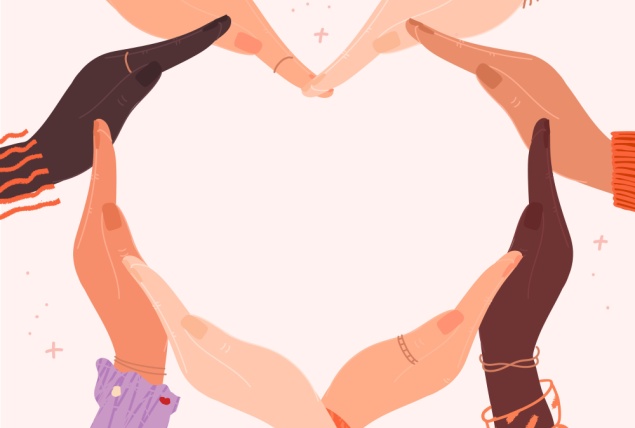How to Have Successful Cross-Cultural Relationships

Key Points
- All couples face speedbumps (or roadblocks) on the road from dating to marriage.
- Intercultural relationships can be uniquely rewarding, but also come with distinct challenges.
- Dating coaches and other experts advise keeping certain tips in mind to overcome hurdles.
If you're an avid fan of TLC's network reality show, "90 Day Fiancé," you probably quivered with collective rage when "Big Ed," a 54-year-old American man who styles his hair with mayonnaise, asked his 23-year-old Filipina girlfriend Rose to shave her legs.
He called her au natural look "gross" and unfeminine.
It was one of the myriad cringe-worthy moments that have made the franchise so successful. It now boasts over 10 seasons documenting Americans and Brits on their journeys from dating to marriage with overseas partners. The show is controversial and, oh, so addictive.
Most tales of intercultural romance—and relationships generally—are not nearly dramatic enough for reality TV, but that's not to say all couples don't have their challenges.
How do you maintain a cross-cultural relationship?
"One of the biggest mistakes people make in cross-cultural dating or international relationships is assuming that love alone is enough to overcome all cultural differences and challenges," said Martha Tara Lee, D.H.S., a relationship counselor and clinical sexologist with Eros Coaching in Singapore.
"While love is important, it's crucial to recognize and understand the cultural nuances and potential conflicts that can arise," Lee said. "Ignoring or dismissing these differences can lead to misunderstandings, frustration and even relationship breakdowns."
Keeping the following six tips in your dating handbook can help you avoid the pitfalls that threaten your cross-cultural relationships.
1. Research your partner's culture
If I had a dollar for every time a member of a "90 Day Fiancé" couple demonstrated their complete lack of knowledge about their partner's culture, I would be as rich as Jorge Nava claimed to be before revealing his 30-grand debt to ex-wife, Anfisa Arkhipchenko.
"It may be the biggest mistake a person can make in an intercultural relationship," said Justine Carino, LMHC, founder of Carino Counseling Services, PLLC, in Westchester, New York.
Although no one is defined by their culture or upbringing, these factors are fundamental in shaping a person's worldview, beliefs, values and expectations. Culture can influence everything from style of dress to communication.
The best strategy is to avoid making assumptions and instead research your partner's culture and inquire about their family, traditions and beliefs so you can better understand society from their perspective.
"We live in a world in which abundant stereotypes reside and it's your responsibility—if you're hoping to be in a relationship with someone—to see them as an individual and not a generalization," said Kaamna Bhojwani, a sexuality and relationship expert based in San Francisco.
"The best way to do this is to be genuinely curious. Ask questions and don't be afraid to offend. If your intentions are to learn, you'll be met with a willingness to teach," Bhojwani said.
Recommended
- How to Keep Your Relationship Healthy When You're Long-Distance: LDRs can be rough, but communication and creativity can help you pull through until your next in-person visit.
- Are You Prepared to Get Busy Abroad?: Before you set out for an overseas adventure, make sure to pack your sexual health necessities along with your passport.
- Are Multiple Dates a Night the Future of Dating?: Dating multiple people can be efficient–and a great way to experience a new city–but it's not without drawbacks.
2. Be respectful
In tandem with learning about your significant other's culture, it's equally crucial to respect it. It's another seemingly obvious point many "90 Day Fiancé" cast members (and their family and friends) often miss.
"Respect is the foundation of any healthy relationship and it becomes even more vital in cross-cultural relationships," Lee said. "Be mindful of cultural sensitivities, traditions and customs. Approach differences with curiosity and respect, seeking to understand rather than criticize or dismiss."
If you aren't sure how to act, Rebecca Walsh (Özbey), a marketing consultant from England who now lives in Kalkan, Turkey, recommends the "wait, watch, learn and adapt" approach.
For example, Walsh's husband's family is quite conservative and traditionally Turkish, prompting Walsh to behave a bit differently when in Bursa versus the United Kingdom. Adjustments like dressing modestly and attending an all-female mosque are nothing more than a courtesy, she said.
"Don't push social norms just because you have a point to prove, it's far better to be respectful," Walsh said.
Kanessa Mulaneh, a founder and business owner in Dubai, agreed that, as cliché as it is, "the magic word is respect."
Mulaneh's family fled Ethiopia and resettled in the Netherlands when she was three. Her husband is from a traditional, rural Dutch background. Although the pair never considered themselves "multicultural," their distinctions are occasionally apparent. It may not always be possible to understand your partner's perspective, she noted—much less that of their family or naysayers offering unsolicited input—but most challenges are conquerable with patience and consideration.
3. Find common ground
Raw physical attraction is sufficient grounds for a steamy vacation fling or sultry online flirtation—the catalyst for at least a third of "90 Day Fiancé" couplings. But when it comes to lasting love, it's important to have shared interests and values.
Besides bridging cultural divides, discovering these commonalities can strengthen your bond and help you to withstand challenges such as physical distance, language barriers and wary in-laws that tend to affect intercultural pairs.
"We share stories of Marmite toast vs. menemen [a traditional Turkish dish of eggs and tomatoes] or beach huts in Dorset versus bee tents in the Kars mountains," Walsh said. "His life has been much tougher than mine but our shared values of kindness, respect, honesty, trust, courtesy and more are all perfectly aligned."
It can be surprising, even exhilarating, to find similarities in unexpected places.
"Many cultures complement one another. People from individualistic cultures like the United States love being held by the community of Asian and Latin cultures," Bhojwani said.
"Many ancient cultures have similar spiritual and philosophical roots. Crossing boundaries with the honest intention of connection is one of the most fulfilling things in the world."
4. Be open-minded
In all likelihood, no one will force you to eat chicken feet or take a cold shower with your fiancée's dad but refusing to try new things—or maintaining that what's different is wrong—can stifle potential for growth in your relationship.
In the short term, you risk insulting your partner, their loved ones and potentially, an entire nation.
"By opening the door to different perspectives, traditions and ways of life, intercultural exchanges can promote empathy and tolerance while fostering personal development," Lee said. "That is if you let them."
For many people, this is one of the most rewarding aspects of cross-cultural exchanges.
"Allow yourself to be challenged," said Julienne (last name withheld for privacy reasons), a post-grad student in London who has lived and dated abroad for 12 years.
"This is not for everyone, but if you're open-minded and are willing to leave your comfort zone and grow as a human being, you will transform into a much more empathetic and understanding person with so much more to you."
5. Communicate
Various tropes have repeatedly played out in the "90 Day Fiancé" universe, but by far one of the most prevalent is couples' seeming inability to communicate.
Language barriers are undoubtedly a major contributing factor, especially where one or both parties make little or no effort to learn the other's language. However, communication issues aren't unique to inter-lingual couples.
"Effective communication is crucial in any relationship, but it becomes even more important in cross-cultural relationships. Be open and honest about your feelings, expectations and cultural differences," Lee said.
"Encourage your partner to do the same. Regularly check in with each other to ensure that you're both on the same page and address any potential conflicts or misunderstandings promptly," Lee said.
Even if you and your partner have no issue communicating with each other, learning at least a few phrases in their mother tongue can be immensely valuable. Not only will it help you make a positive impression on their family, but it shows you're investing in them and learning about their culture.
Walsh's husband's father was initially apprehensive about her being a divorced, non-Muslim Brit. But she said that his mouth dropped open when she formally greeted him in Arabic on their first meeting.
"I followed it up with a huge British hug and so bridges were crossed, and cultural divides lessened in a few minutes," she said, adding that "a cuddle and a smile breaks down every barrier."
6. Be prepared to teach
While the "90 Day Fiancé" franchise isn't without flaws, one positive aspect is its ability to showcase—usually in a flattering light—countries and cultures that may be unfamiliar to predominantly American viewers.
Besides shots of stunning landscapes, bustling cities, delicious cuisine and traditional pastimes, it primarily does so through the lens of its international cast members, some of whom make valiant efforts to teach their partners and partners' loved ones about their culture.
While it isn't your sole responsibility to educate anyone, including your significant other or their folks, it can help to break down barriers and heighten understanding.
Although Mulaneh's in-laws welcomed her, they couldn't fathom her background, having little knowledge of Ethiopia or Africa, and had formed certain preconceptions which she did her best to rectify.
"I started to be more open about my background. To show them like, 'This is how it looks. This is the capital. This is a picture of what our house there looks like. This is the lifestyle that we live,'" she said. "I took the role of being an educator in the family when it comes to my culture."
Even her husband didn't fully comprehend Mulaneh's background until visiting her homeland.
"Before we got married, we went to Ethiopia and I showed them the place where I was born. I think that opened his eyes," she said. "He understood who I really was or where I came from from that moment on."
The bottom line
When done "for the right reasons," cross-cultural dating can not only vastly expand your dating pool, but provide ample opportunities for learning, self-development and, perhaps, a prime time-worthy romance.
Though some challenges are distinct to cross-cultural unions, every couple faces roadblocks on the path from dating to marriage or lifelong, non-legally binding partnership.
With mutual effort and respect, love can find a way.


















